On 15 June the island of Malta was awarded the George Cross for heroism, after enduring so many air raids by the Luftwaffe (over 2,000 since the war began). On 18 June the “Doolittle raid” against Japan took place, when 16 American bombers launched from aircraft carriers to attack targets on the Japanese mainland, including Tokyo, for the first time. Also this week, in order to reduce manufacturing times new clothing restrictions were announced that would come into force in June, including a ban on pockets on pyjamas, a ban on double-breasted suit jackets, and on lace on women’s underwear.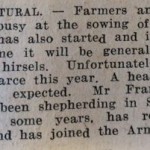
Back in Caithness, spring had arrived. As the John O’Groat Journal reported in Dunbeath, “Farmers and crofters are now busy at the sowing of the corn. Lambing has also started and in about a week’s time it will be general in parks and hill hirsels. Unfortunately lambers will be scarce this year. A heavy crop of lambs is expected.” (A hirsel in Scotland is a piece of land grazed by a flock of sheep.)
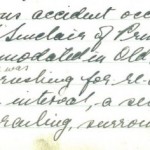 Since the war began, and with many school buildings commandeered by the military, a
Since the war began, and with many school buildings commandeered by the military, a 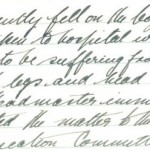 number of schoolchildren had been taught in church and village halls. But this was not always a safe environment for children. On 14 April the Wick North School log book records, “A serious accident occurred today to William Sinclair of Primary 11a – accommodated in Old Parish Church. While he was rushing for reassembly after the 11 a.m. interval, a section of heavy iron railing, surrounding a grave, apparently fell on the boy, and he was taken to hospital where he was found to be suffering from fracture of both legs and head injuries.”
number of schoolchildren had been taught in church and village halls. But this was not always a safe environment for children. On 14 April the Wick North School log book records, “A serious accident occurred today to William Sinclair of Primary 11a – accommodated in Old Parish Church. While he was rushing for reassembly after the 11 a.m. interval, a section of heavy iron railing, surrounding a grave, apparently fell on the boy, and he was taken to hospital where he was found to be suffering from fracture of both legs and head injuries.”
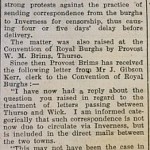 The question of censoring the county’s letters was finally resolved this week. Previously even local correspondence had to be sent down to Inverness to be reviewed by the censor, before being sent back to Caithness for delivery, “thus causing four or five days’ delay.” Now the John O’Groat Journal reported that correspondence passing between Thurso and Wick “is not now due to circulate to Inverness” but would be delivered directly.
The question of censoring the county’s letters was finally resolved this week. Previously even local correspondence had to be sent down to Inverness to be reviewed by the censor, before being sent back to Caithness for delivery, “thus causing four or five days’ delay.” Now the John O’Groat Journal reported that correspondence passing between Thurso and Wick “is not now due to circulate to Inverness” but would be delivered directly.
Tragically, an R.A.F. bomber flying out of Wick airport had crashed at Papigoe by Wick, 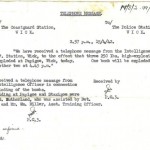 killing all the crew. The plane had been carrying live bombs which could not be retrieved but had to be blown up. On 15 April the Wick Coastguard informed the police: “We have received a telephone message from the Intelligence Officer, R.A.F. Station, Wick, to the effect that three 250-lbs. high-explosive bombs will be exploded at Papigoe, Wick, today. One bomb will be exploded at 4 p.m. and the other two at 4.45 p.m.” A note on the message form states that “the people residing at Papigoe and Staxigoe were informed.”
killing all the crew. The plane had been carrying live bombs which could not be retrieved but had to be blown up. On 15 April the Wick Coastguard informed the police: “We have received a telephone message from the Intelligence Officer, R.A.F. Station, Wick, to the effect that three 250-lbs. high-explosive bombs will be exploded at Papigoe, Wick, today. One bomb will be exploded at 4 p.m. and the other two at 4.45 p.m.” A note on the message form states that “the people residing at Papigoe and Staxigoe were informed.”
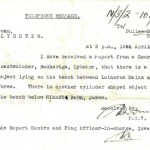 Unidentified items were still being washed up along the county’s shores. On 16 April Constable Green of Lybster reported: “I have received a report from George McLeod, Coastwatcher, Badhariga, Lybster, that there is a cone-shaped object lying on the beach between Latheron Mains and March Farm, Forse. There is another cylinder-shaped object also lying on the beach below Niandt Farm, Forse.”
Unidentified items were still being washed up along the county’s shores. On 16 April Constable Green of Lybster reported: “I have received a report from George McLeod, Coastwatcher, Badhariga, Lybster, that there is a cone-shaped object lying on the beach between Latheron Mains and March Farm, Forse. There is another cylinder-shaped object also lying on the beach below Niandt Farm, Forse.”
Finally this week, after its success in providing a Spitfire aircraft, the county was gearing  up for “Warship Week” in May, to raise funds for a Caithness destroyer. The John O’Groat Journal this week printed a light-hearted cartoon, intended to raise awareness for the coming fundraiser.
up for “Warship Week” in May, to raise funds for a Caithness destroyer. The John O’Groat Journal this week printed a light-hearted cartoon, intended to raise awareness for the coming fundraiser.
